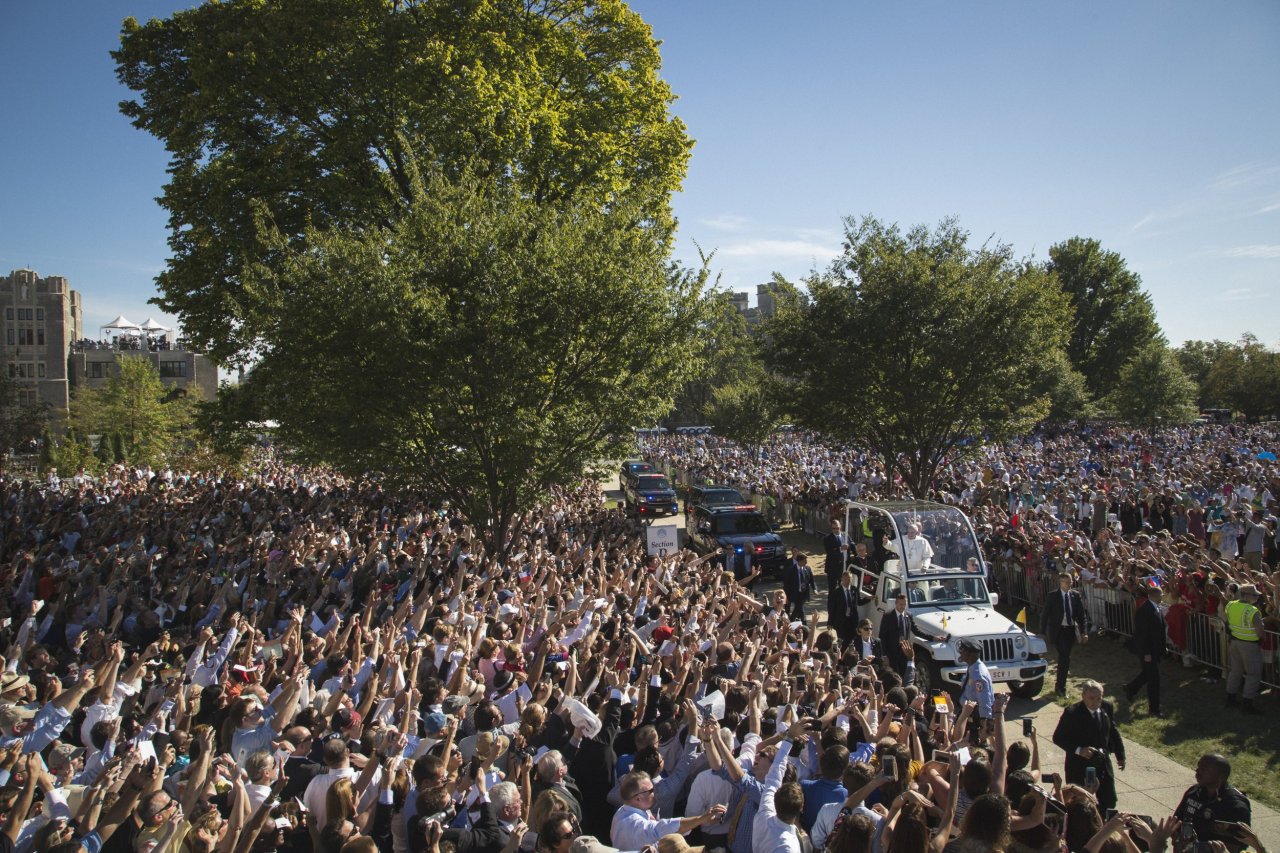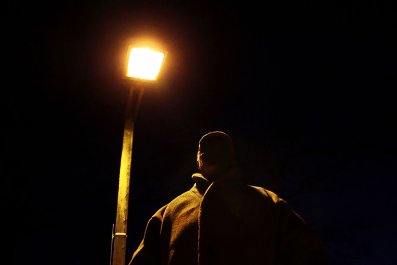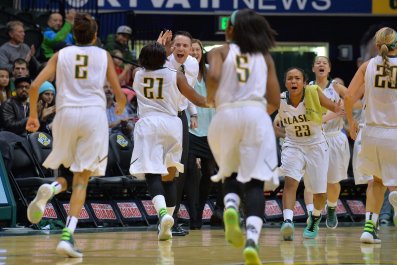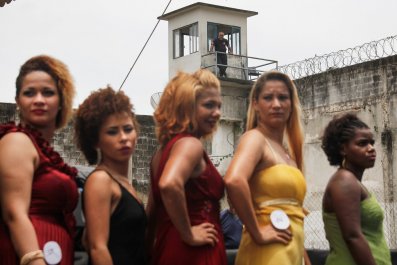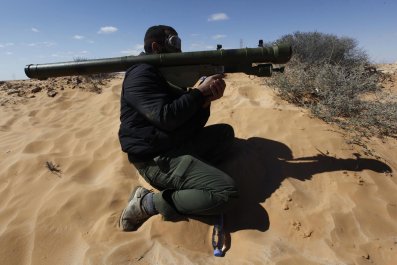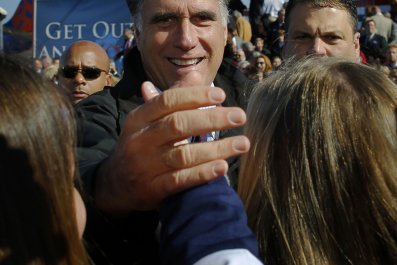John Muir was a fervent believer. Not just in science or conservation or the National Park Service, which he championed. The founder of the Sierra Club and father of American environmentalism also believed in God. "The forests of America, however slighted by man, must have been a great delight to God," Muir wrote in his 1897 essay "The American Forests." "[For centuries] God has cared for these trees, saved them from drought, disease, avalanches, and a thousand straining, leveling tempests and floods; but he cannot save them from fools."
This sort of religious language was "very much present in early conservation movements," says Evan Berry, an associate professor at American University and author of Devoted to Nature: The Religious Roots of American Environmentalism. George Bird Grinnell, founder of the Audubon Society, also invoked faith, and many of the environmentalist leaders in the late 19th and early 20th century were Congregationalists, a traditional Protestant sect, says Berry.
But then God abandoned the forest. During the Great Depression and two world wars, environmentalism took a backseat to what felt like more pressing issues, only to re-emerge in the 1960s in more secular forms, like Rachel Carson's book Silent Spring. The new wave, Berry says, "wanted to build practical, policy-driven solutions to environmental problems without getting caught up in the messiness of religious ethics."
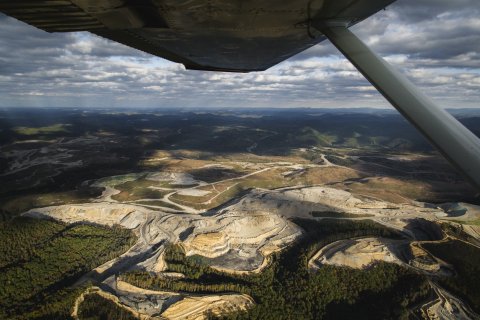
For years, conservationist and faith-based views on the environment progressed on separate tracks, but in 1986 Prince Philip, then president of the World Wildlife Fund, organized a summit where leaders of the five major world religions—Buddhism, Christianity, Hinduism, Islam and Judaism—discussed how their faiths could help save the natural world. By the 1990s, religious groups such as the World Council of Churches were participating in international climate debates and conferences.
"In the late 1990s, the Evangelical Environmental Network helped defend the Endangered Species Act in Congress, characterizing it to The New York Times as the "Noah's ark of our day." In 2002, the network launched a headline-grabbing "What Would Jesus Drive?" campaign to call attention to fuel efficiency. In 2006, the group organized the Evangelical Climate Initiative, which released a statement making a moral argument for climate action. Dozens of evangelical leaders signed, including Rick Warren, Leith Anderson and Joel Hunter, whose megachurches have tens of thousands of members. Meanwhile, the Regeneration Project's "Interfaith Power and Light" campaign, which launched in 2000 as "a religious response to global warming," rapidly expanded its membership. According to the campaign's president, the Reverend Sally Bingham, the organization comprised 14 congregations in California in 2001; today, it is in 40 states and includes some 18,000 congregations.
The interfaith section of the 2014 People's Climate March in New York City saw thousands of people from more than 30 faiths—Baptist, Zoroastrian and everything in between—rally for climate action. The World Council of Churches, representing hundreds of millions of Christians, has committed to divesting its multimillion-dollar endowment from fossil fuels. At December's historic climate summit in Paris, there were morning worship groups, Vatican negotiators and an exhibit at Notre-Dame Cathedral called "Ode to God's Creation." "None of this was really on the horizon 20 years ago," says Mary Evelyn Tucker, co-director of the Forum on Religion and Ecology at Yale University. "There has been an explosion."
Still, America's attitude toward climate change continues to be characterized by apathy. According to a 2014 Gallup poll, Americans rank the environment and climate change near the bottom of their priority list; putting the concerns at 13th and 14th (out of 15), respectively. By comparison, a September CBC poll showed that Canadians rank the environment second (out of 13) on their list of most important issues, ahead of education, jobs and foreign policy. And caring in the U.S. breaks along political lines. A 2014 Public Religion Research Institute poll shows that while 65 percent of Democrats believe climate change is manmade, only 22 percent of Republicans do.
As faith-based environmental activism—"creation care," as many call it—continues to grow, it hopes to help America break through some of these barriers. Whether that means reaching conservative politicians through faith or prompting action from the pews, the idea is that religion can move those unconvinced by the science.
Blown Off the Commode
On February 23, 1980, at age 16, Charlotte Keys was born again. "It gave me the strength and the ability not to have fear," she says of her Pentecostal faith. It also led her to see homosexuality as a sin, evolution as dubious and abortion as violating the sanctity of human life. That's the word of God. And for the same reason, she's an environmentalist.
Keys found her calling about a decade later. She was working in the county clerk's office, where she came across documents detailing a chemical spill in the Web Quarter neighborhood of Columbia, Mississippi, where she grew up. "When I discovered that we had a lot of health problems going on, the Lord just moved in my spirit," says Keys. "God's people don't deserve this."
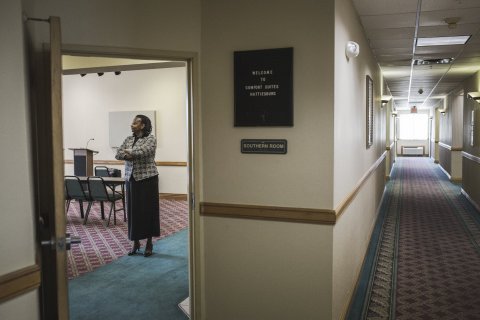
According to the Environmental Protection Agency, the Reichhold chemical plant was home to turpentine, diesel, the now-restricted pesticide pentachlorophenol and countless other chemicals. In March 1977, it exploded, and the Web Quarter took a direct hit. One local recalls her neighbor across the street being blown off the "commode." Residents say chemicals seeped down the runoff ditches and into the ground, and for years the grass would spontaneously burst into flames. The EPA declared the area a Superfund hazardous waste site. Workers in protective suits cleaned up what they could, and activists say the company disposed of the rest. Although the EPA took the site off its priority list in 2000, many in the community believe the Web Quarter remains contaminated. "I'm scared I won't wake up one morning," says Mack Oatis, who has lived in the neighborhood most of his life.
Appalled, Keys founded a nonprofit called Jesus People Against Pollution in 1992, and for more than two decades that's been her mission. She calls it her "kingdom assignment" from God. Gradually, her work has grown to include not only the Reichhold spill but also clean air and clean power legislation, issues she collaborates on with organizations such as WE ACT, an environmental group based in Harlem, New York. Still, her main goal is to relocate as many people as possible from the Web Quarter to a small community on the other side of town to be made up of a church, 16 housing units, a snack bar and her own house. With time and financial support from her husband, Willie, she's amassed about 9 acres of land and poured a 1,800-square-foot concrete pad upon which she plans to build the American Temple Apostolic Church.
In the meantime, her ministry is in a small conference room at a Comfort Suites off U.S. Highway 98. It has a lectern that doubles as a pulpit, and there's a continental breakfast in the lobby. "Whoever shows up, shows up," the Reverend Keys says on her way to service one Sunday. The three rows of tables can get cramped when 15 people come, but sometimes only one or two attend. After a quick stop to pick up one of her congregants, she heads to the hotel.
Once inside the conference room, she passes around a handout with "God creates" at the top. Aside from the one man who came with Keys, there is a couple, Lakeidra and Maurice Keys (no relation), and their four children. To begin the morning, they all join in a rendition of the gospel song "What a Mighty God We Serve," which is followed by an opening prayer and a bit more singing. Then it is time to focus. "Look at your scripture." Lakeidra says, separating Kyliah, 7, and his brother, Jyisiah, 5. "Pay attention." Distractions dealt with, Keys opens to the Book of Genesis. "In the beginning, God created the heaven and the earth," she booms. "But do you think God created this stuff for us to mess it up?" "No," comes the response in imperfect unison.
Keys is far from the only religious figure fighting for environmental action. The Reverend John Rausch in Kentucky is going after Big Coal. The Reverend Jeffrey Allen is drawing attention to polluting practices such as mountaintop removal in West Virginia. And Katharine Hayhoe, director of the Climate Science Center at Texas Tech University, is breaking the climate activist mold. She used to rely solely on science to make the case for why we need to deal with climate change, but she frequently sensed a disconnect with her Texan audience. Trying a new tact, Hayhoe started to bring her evangelical beliefs into the conversation. Initially, she says, it felt like "pulling down your pants in public," but she and her pastor husband went on to author the book A Climate for Change: Global Warming Facts for Faith-Based Decisions. The book's creation care message took off and landed her on Time's list of "The 100 Most Influential People" and Showtime's Years of Living Dangerously, a program about global warming. "Until we connect all those [scientific] facts to our hearts," says Hayhoe, "we lack the motivation to act."
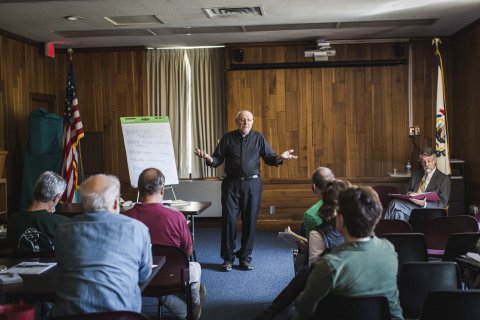
Momentum for this moral approach to climate action reached new heights when Pope Francis made environmentalism a pillar of his papacy. The effort began with his choice of namesake—Saint Francis of Assisi, who is considered the unofficial patron saint of ecology—and reached a crescendo this past summer with the release of a nearly 200-page encyclical, "Laudato Si': On Care for Our Common Home." In it, the pontiff argues that we need to accept climate change as real and recognize that if we don't do anything about it, it will soon cause devastation to the poor and disadvantaged across the world. Speaking from the South Lawn of the White House this fall, Francis issued a call to action: "Climate change is a problem which can no longer be left to our future generation. I would like all men and women of goodwill in this great nation to support the efforts of the international community to protect the vulnerable in our world."
It appears his people may be listening. Polling from the Yale Project on Climate Change Communication shows that between March and October the number of American Catholics who say they believe in climate change rose from 64 to 74 percent; the number who say the issue is very or extremely important to them personally jumped from 15 to 23 percent.
Sierra Club Weirdos
Keys remembers the 1990s fondly. She says Jesus People Against Pollution had 500 members, held rallies and marched. Residents remember her coming around and asking them to sign a petition demanding restitution from the chemical company. Decades later, though, many of the houses in the Web Quarter are run-down, and people still complain of a litany of ailments they believe are linked to the chemical plant—from cancer to super-sized mosquitoes. Some direct their frustration at Keys, accusing her of hoarding settlement money or being driven by ego. More often, they're sullenly indifferent. When Keys organized an October community meeting about the Clean Power Plan at a neighborhood church, only a handful of people showed up. One girl, wearing an orange T-shirt that read, "Be the change you wish to see in the world," spent much of the time staring at her phone. Another man fell asleep, snoring.
"It's a process," says Keys, standing on her front porch. "And the process is not easy." She steps inside briefly and comes back out dabbing tears. Having sunk all of her resources into her kingdom assignment, she and her husband live in a double-wide trailer on Friendship Church Road. Its blue paint is peeling, the floor is so swollen with water from a 2014 tornado that the door doesn't quite shut, and the roof sometimes leaks when it rains. "I never thought in a million years I would be doing what I'm doing and seemingly to be stuck," she says.
Keys's struggles point to some of the hurdles facing the creation care movement. Declining church attendance, for one, has limited the reach of some faith leaders. Perhaps more problematic, however, is that religious donor bases have been historically tied to the fossil fuel industry or the political right—entities hardly eager to finance climate awareness. That often pushes activists toward more secular environmental groups, which in turn can put them in the difficult position of choosing between funding and their beliefs.
"I pray that my faith-based belief doesn't drive help away," says Keys. "To some extent, it may." But for her, separating religion and the environment is impossible. "This earth belongs to the Lord, whether we like it or not," she asserts. Evangelical Environmental Network President Mitch Hescox is in a similarly sticky situation. "We consider creation care an aspect of the pro-life movement," he says. That's why he steers clear of "the far left" and groups like the Sierra Club, which he calls "a bunch of weirdos."
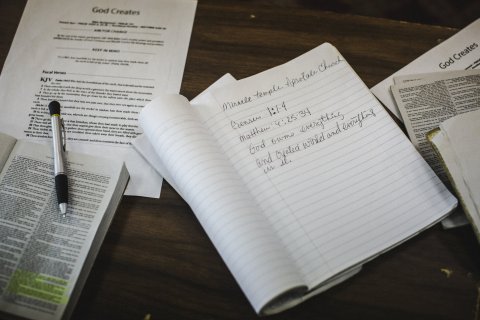
The problem is that many powerful Christian groups toward the right of the political spectrum are wary of—if not outright hostile to—creation care. "As soon as the [Evangelical Climate Initiative] was launched, a network of Christian right leaders forcefully attacked," writes sociologist Lydia Bean in a paper titled "Spreading the Gospel of Climate Change." Unlike the Endangered Species Act or "What Would Jesus Drive?" efforts, the creation care push in the mid-2000s both affirmed human-caused climate change and called for federal legislation to lower greenhouse gas emissions. "[This went] directly against the anti-big-government, anti-regulation ideology that keeps the GOP coalition together," says Bean. In the face of stiff resistance, many of the initiative's signatories went quiet, support wilted and progress slowed.
At the center of the backlash to creation care is theology professor Calvin Beisner. He's the founder of the Cornwall Alliance, a nonprofit that argues the evidence for catastrophic anthropogenic climate change is not convincing, that humans hold "godly dominion" over the planet and that free markets are the best engine of ecological stewardship. Through media campaigns and advocacy—like Resisting the Green Dragon, a set of 12 DVDs and a book outlining the "Christian response to radical environmentalism"—Beisner has rallied the Christian right. By making creation care controversial, he's been able to keep risk-averse evangelical leaders away and undoubtedly made it easier for establishment GOP politicians—such as Jeb Bush—to stand against it as well. "I don't get economic policy from my bishops or my cardinals or my pope," said the former presidential candidate, one of many Republicans who have dismissed the "Laudato Si'" encyclical.
Nevertheless, creation care appears to be adapting and growing. After the Evangelical Climate Initiative stumbled, leaders of the campaign realized they needed widespread, on-the-ground support. "We did not have a strong grassroots movement," says Hescox. The group, he says, has since increased outreach efforts and grown from about 15,000 people to over 800,000 in the past six years. The aim is to reach 3 million within the next two.
If that's to happen, certain demographics will likely be key. Public Religion Research Institute polling found, for example, that Hispanic Catholics are much more likely to agree that global temperatures are rising primarily as a result of human activity than their white counterparts (61 versus 40 percent). The creation care message is also much more likely to resonate with younger Christians. "We are willing to vote for people who are willing to take action on climate," says Rachel Lamb, 26, the spokeswoman for Young Evangelicals for Climate Action, a nonprofit focused on mobilizing evangelicals under 30. They have people on the ground in roughly a dozen states, with a focus on conservative swing districts. By starting from a Christian foundation, Lamb says, the organization is able to visit campuses (like Oral Roberts University in Oklahoma) unlikely to host traditional environmental groups. If they can get Christian youth on the side of environmentalism, then it won't be long before religious and conservative leaders have no choice but to listen.
That Triggering Moment
It was a youth group that convinced former Senator Bob Inglis to shift his stance on climate change: his kids. When they reached voting age, they asked the South Carolina Republican to reconsider the issue. Driven by science and faith, Inglis has gone on to propose conservative solutions—like pairing carbon pricing with tax cuts—that led Slate to dub him "America's best hope for near-term climate action." "We are now stewards in this wonderful creation," he said in an interview with the Evangelical Environmental Network. "Part of being faithful, it seems to me, is coming up with a way so that our society can really respond to this challenge of energy and climate."
Reverend Gerald Durley is another creation care convert. The retired pastor at Atlanta's Providence Missionary Baptist Church once scoffed at the idea of prioritizing polar bears," preferring to emphasize topics such as racial justice or health. Then, in the mid-2000s, he saw a screening of The Great Warming, a documentary that used both science and evangelical thinking to talk about the dangers of global warming. "After that, I began to connect the dots,'" Durley says. He now believes climate change is one of the most urgent issues he can address from the pulpit.
"This will be the civil rights issue of our time," says Durley, an International Civil Rights Walk of Fame inductee who marched alongside Martin Luther King Jr. He points out that in the 1950s and '60s "there were hardcore skeptics who said, 'You'll never vote'"—that African-Americans might march but would never make it to the polls. Durley says faith was integral in proving that prediction wrong, and the lesson still applies today. Churches can be a powerful organizing tool, and religion offers a moral backbone and motivation to supporters. Another key, says Durley, is a flashpoint that brings a movement to the masses. A major catalyst in the civil rights movement, he notes, was the 1963 bombing of a black church in Birmingham, Alabama, that killed four young girls and injured numerous people. The incident led to national outrage, action and eventually change.
Once people form a personal connection to the issue, religion can be a strong motivator, says Cybelle Shattuck, a University of Michigan researcher who has been looking at the factors that influence faith-based environmental action at the community level. People she's interviewed have told her "their faith gives them the ability to try something even if they don't know they can do it." And former Secretary of the Interior Bruce Babbitt, an environmental advocate, says faith is pushing the climate movement closer to real change. "Political tipping points do come," he says, "and they change us overnight." Police violence against minorities is a recent example. Following a string of high-profile incidents, Gallup polls show that the percentage of Americans who report caring "a great deal" about the broader issue of "race relations" has jumped from 17 to 28 percent in just the past year.
These days, Christian environmental advocates like Keys are crisscrossing the country, hoping to bring about a similar shift in support for sustainability and conservation. That often means long stretches on the road, dwindling bank accounts and plenty of visits to Washington, D.C., including stops at the White House. Keys doesn't know where all of this running around will ultimately take her or the creation care movement, but she's heartened by the community of supporters and colleagues steadily growing around her. "I've never seen this magnitude of effort from the religious community placed on environmentalism," Keys says. "It's going to take the Christians who have the fear of God in them."
Chris Berdik contributed reporting to this article, which was supported by a grant from the Society of Environmental Journalists.
Correction: A previous version of this article incorrectly implied that the Endangered Species Act was passed by Congress in the 1990s. In fact, it was passed by Congress in 1973.



